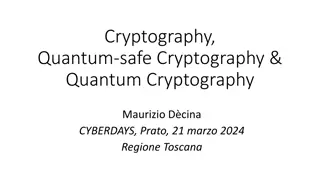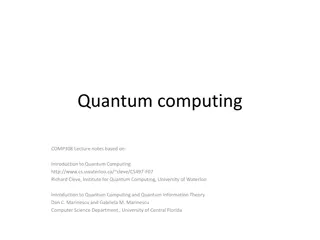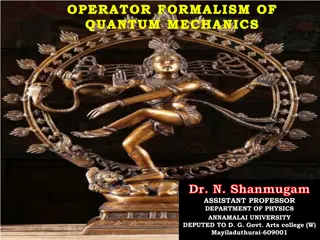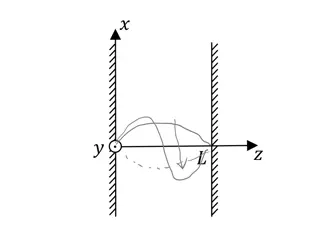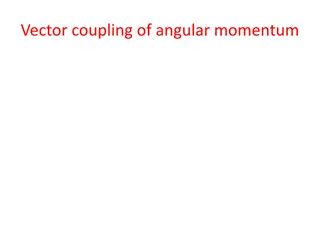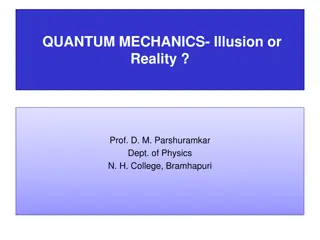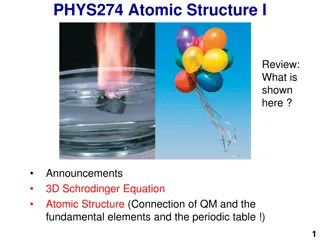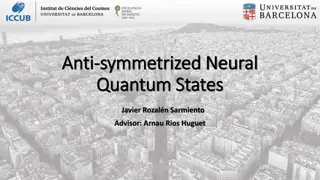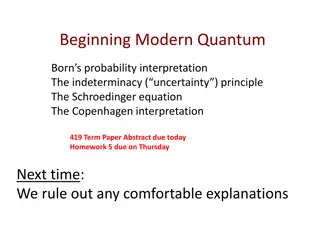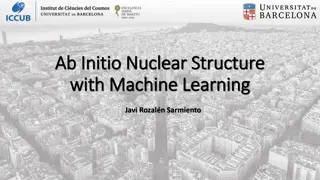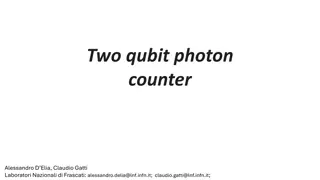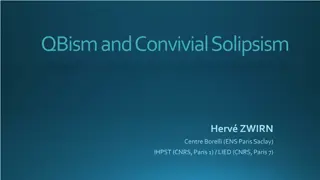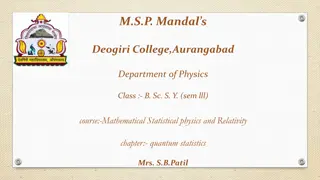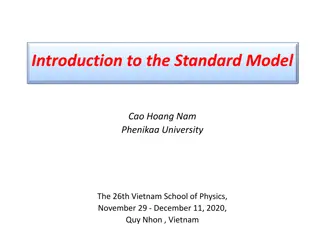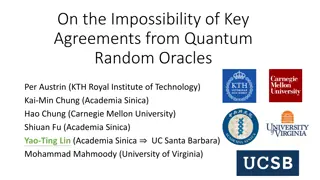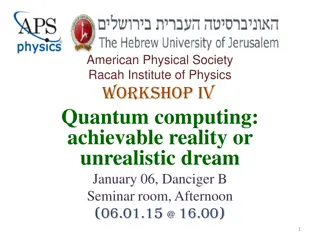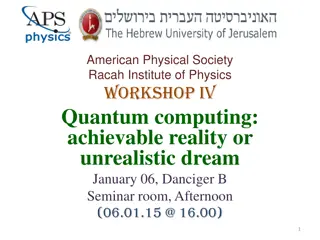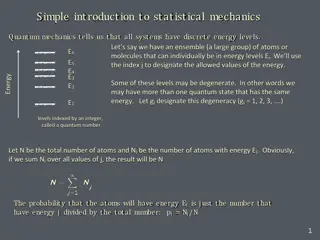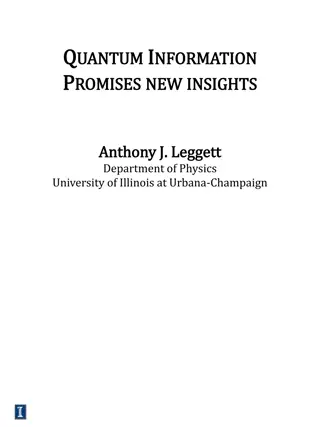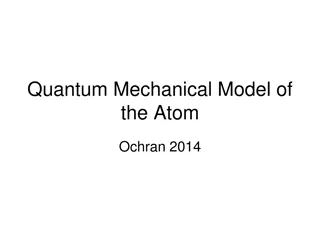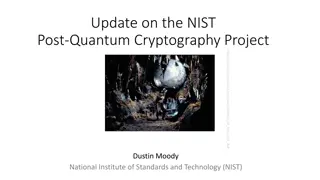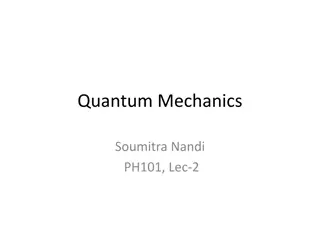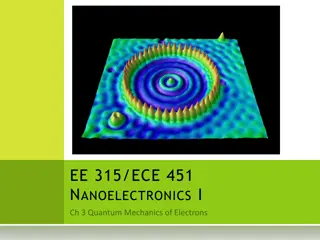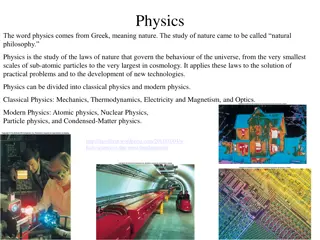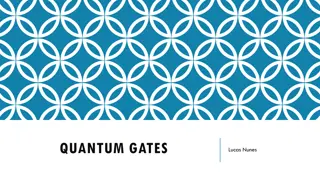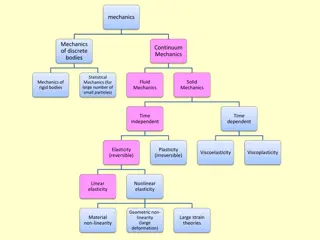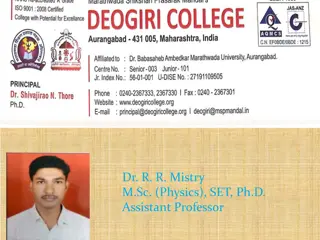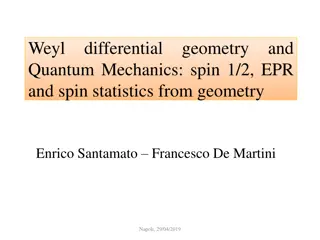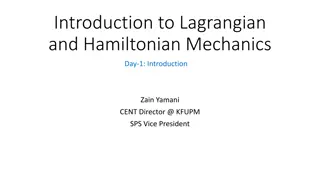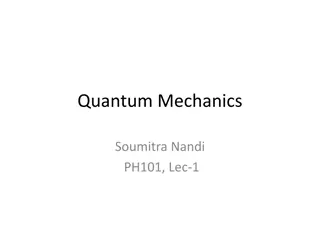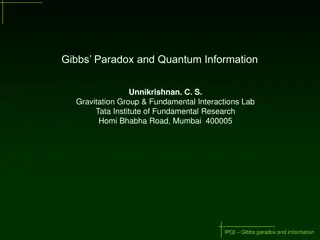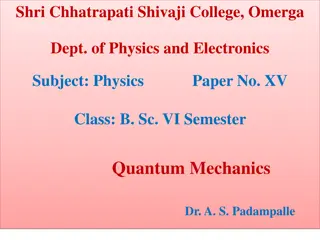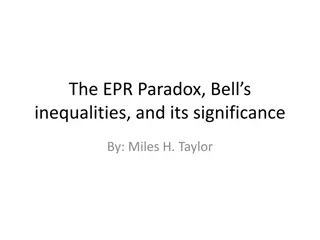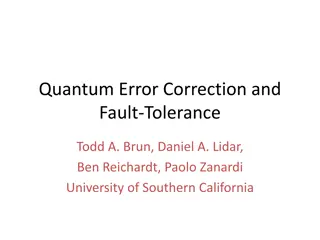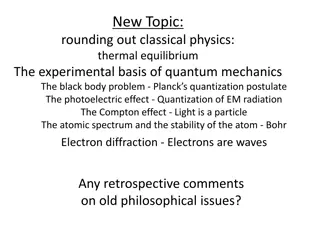Cryptography,.Quantum-safe Cryptography& Quantum Cryptography
Dive into the world of cryptography, quantum-safe cryptography, and quantum technology as discussed in Maurizio D. Cina's presentation at CYBERDAYS in Prato. Topics include current cryptosystems, post-quantum cryptography, quantum key distribution, and future cryptosystems based on quantum algorithm
5 views • 17 slides
CERN Quantum Technologies Initiative Overview
The CERN Quantum Technologies Initiative (QTI) aims to explore the impact of quantum technology on CERN's physics programs. This phase involves identifying key areas for collaboration, conducting scientific investigations, and building quantum capacity. The strategy and roadmap were developed with i
6 views • 14 slides
Addressing The Quantum Threat: The Quantum Resistant Ledger
The Quantum Resistant Ledger (QRL) is a visionary blockchain and digital asset security solution designed to counter the emerging threat of quantum computing. With quantum technology advancing and traditional blockchains at risk, QRL offers an industrial-grade, quantum computer-resistant cryptocurre
2 views • 9 slides
Introduction to Quantum Computing: Exploring the Future of Information Processing
Quantum computing revolutionizes information processing by leveraging quantum mechanics principles, enabling faster algorithms and secure code systems. Advancements in quantum information theory promise efficient distributed systems and combinatorial problem-solving. Discover the evolution of quantu
0 views • 68 slides
Near-Optimal Quantum Algorithms for String Problems - Summary and Insights
Near-Optimal Quantum Algorithms for String Problems by Ce Jin and Shyan Akmal presents groundbreaking research on string problem solutions using quantum algorithms. The study delves into various key topics such as Combinatorial Pattern Matching, Basic String Problems, Quantum Black-box Model, and mo
0 views • 25 slides
Understanding Operator Formalism in Quantum Mechanics
Dive into the world of quantum mechanics with Dr. N. Shanmugam as he explains the role of operators, their significance in quantum mechanics, and how they are used to determine physical quantities through expectation values. Explore concepts such as the Hamiltonian operator, time-independent Schrodi
1 views • 49 slides
Understanding Quantum Aspects of Electromagnetic Oscillations
Exploring the quantum nature of electromagnetic oscillations through concepts such as wave-particle duality, quantum harmonic oscillators, photon-number states, coherent light, and squeezed light. Delve into non-classical states, vacuum states, potential wells, and more in the fascinating world of q
1 views • 15 slides
Understanding Angular Momentum in Quantum Mechanics
Exploring the concept of total angular momentum in quantum mechanics, which involves the quantization of orbital and spin angular momenta. The coupling of these vectors leads to the formation of total angular momentum, with implications for the behavior of single-electron systems like the hydrogen a
0 views • 16 slides
Exploring Quantum Mechanics: Illusion or Reality?
Delve into the fascinating realm of quantum mechanics with Prof. D. M. Parshuramkar as he discusses the contrast between classical and quantum mechanics. Discover how classical mechanics fails to predict the behavior of electrons in atoms and molecules, leading to the development of quantum mechanic
1 views • 70 slides
Understanding Quantum Mechanics in Atomic Structure
Exploring the connection between quantum mechanics and the fundamental elements of the periodic table, this material delves into the Schrödinger equation, quantization of angular momentum and electron spin, and the implications on atomic structure. The content covers writing the Schrödinger equati
1 views • 32 slides
Exploring Neural Quantum States and Symmetries in Quantum Mechanics
This article delves into the intricacies of anti-symmetrized neural quantum states and the application of neural networks in solving for the ground-state wave function of atomic nuclei. It discusses the setup using the Rayleigh-Ritz variational principle, neural quantum states (NQSs), variational pa
1 views • 15 slides
Unraveling the Enigmatic World of Quantum Mechanics
Delve into the perplexing realm of modern quantum mechanics, exploring concepts such as Born's probability interpretation, the indeterminacy principle, the Schrödinger equation, and the fascinating duality of particle-wave behavior. Gain insights into the transformative impact of quantum theory on
1 views • 16 slides
Exploring Nuclear Structure with Machine Learning and Quantum Mechanics
Delve into the world of ab initio nuclear structure through the lens of machine learning and quantum mechanics. Discover the power of neural networks in approximating functions, live neural network training, symmetries in physical properties, and the role of group theory in understanding atomic nucl
0 views • 13 slides
Quantum Circuit Simulations and Electromagnetic Analyses in Quantum Photonics
Explore the world of quantum photonics with insights into two-qubit photon counters, jointed cavities, qubit pads, and quantum circuit simulations. Ansys simulations and experimental data by researchers Alessandro D'Elia and Claudio Gatti provide in-depth analysis of quantum phenomena. Discover the
0 views • 7 slides
QBism and Convivial Solipsism in Quantum Interpretations
QBism and Convivial Solipsism present different interpretations of quantum mechanics, focusing on the subjective nature of probabilities and experiences within the quantum formalism. QBism emphasizes the subjective interpretation of probability, considering the quantum state as a tool for assigning
0 views • 30 slides
Development of Quantum Statistics in Quantum Mechanics
The development of quantum statistics plays a crucial role in understanding systems with a large number of identical particles. Symmetric and anti-symmetric wave functions are key concepts in quantum statistics, leading to the formulation of Bose-Einstein Statistics for bosons and Fermi-Dirac Statis
1 views • 15 slides
Understanding the Standard Model of Physics
Delve into the world of quantum field theory, gauge symmetry, Higgs mechanism, electroweak theory, and more with this detailed overview of the Standard Model. Explore classical mechanics, Noether's theorem, relativistic mechanics, quantum mechanics, and quantum field theory concepts. Discover how th
1 views • 21 slides
Quantum Key Agreements and Random Oracles
This academic paper explores the impossibility of achieving key agreements using quantum random oracles, discussing the challenges and limitations in quantum communication, cryptographic protocols, quantum computation, and classical communication. The study delves into the implications of quantum ra
0 views • 29 slides
Quantum Computing: Achievable Reality or Unrealistic Dream Workshop
Explore the intriguing realm of quantum computing through insightful lectures by Prof. Gil Kalai and Prof. Nadav Katz at the American Physical Society workshop. Delve into the possibilities, failures, and advancements in quantum information science. Join the discussion on the state-of-the-art develo
0 views • 13 slides
Insights on Quantum Computing: Bridging Theory and Reality
Delve into the world of quantum computing through a series of workshops and personal reflections. Explore the intersection of theoretical concepts with practical applications, highlighting the evolving landscape of quantum mechanics. The journey navigates discussions on electron spin, fundamental th
0 views • 12 slides
Introduction to Statistical Mechanics and Quantum Mechanics
In statistical mechanics, quantum mechanics teaches us that all systems have discrete energy levels. By examining ensembles of atoms or molecules with different energy levels, we can understand probabilities, thermal equilibrium, and average energy using Boltzmann's postulate and the partition funct
0 views • 5 slides
The Logical Structure of Classical and Quantum Mechanics
The paper explores the common logical structure shared between classical and quantum mechanics, emphasizing the non-distributive lattice embedded in a distributive one. It discusses how all physical theories must adhere to this structure, incorporating topology, Heyting algebra, Boolean algebra, and
1 views • 36 slides
Exploring Quantum Information through Polarization of Photons
Quantum information and photon polarization are explored in this detailed presentation featuring the ultimate quantum 2-state system. The content delves into the behavior of single photons at a quantum level, showcasing the intriguing properties and implications of quantum superposition in polarizat
1 views • 14 slides
Evolution of Atomic Models: From Rutherford to Quantum Mechanics
Various atomic models have been proposed throughout history, starting with John Dalton's idea of atoms as tiny particles to J.J. Thomson's Plum Pudding model. Ernest Rutherford's discovery of the nucleus and Niels Bohr's quantum model of the atom revolutionized our understanding. Bohr's proposal of
0 views • 38 slides
Understanding Quantum Computing and Its Impact on Cryptography
Quantum computing utilizes the principles of quantum mechanics to process information exponentially faster than classical computers. This advancement poses a significant threat to current cryptographic systems, especially those reliant on factors like RSA and Diffie-Hellman key exchange. If large-sc
0 views • 25 slides
Exploring the Fascinating World of Quantum Mechanics Through History
Delve into the intriguing realm of quantum mechanics starting from its basic postulates, probability amplitudes, and measurement principles. Discover how unexplained observations in atomic structures led to the development of quantum mechanics, addressing classical physics problems like Black Body R
0 views • 11 slides
Understanding Quantum Mechanics Postulates and Operators
Explore the foundational principles of quantum mechanics, including postulates describing quantum systems, wavefunctions, probabilistic nature, Hermitian operators, eigenvalues, and their significance in measuring physical observables.
0 views • 16 slides
Exploring Physics: From Classical Mechanics to Relativistic Quantum Mechanics
Physics, derived from Greek meaning "nature," encompasses the study of the laws governing the universe at all scales. Classical physics delves into mechanics, thermodynamics, electricity, and optics, while modern physics covers atomic, nuclear, and particle physics. Relativistic Quantum Mechanics co
0 views • 14 slides
Understanding Quantum Computing: Quantum Gates, Bits, and Applications
Explore the world of quantum computing with this detailed guide covering quantum bits, gates, their applications, and the advancements made in the field. From classical bits to qubits, Bell states, and quantum gates, discover the fundamental principles that drive quantum computing forward.
0 views • 37 slides
Overview of Mechanics and Continuum Mechanics
Mechanics explores the motion of matter and forces influencing it, covering topics such as Elasticity, Plasticity, and Viscoelasticity. Continuum Mechanics delves into the mechanics of bodies, focusing on continuity, homogeneity, and isotropy. Understanding external forces, stresses, and elasticity
0 views • 28 slides
Understanding Classical Mechanics and Quantum Theory: A Comprehensive Overview
Explore the fundamental principles of classical mechanics and quantum theory through the insightful teachings of Dr. R. R. Mistry. From the mechanics of particles to the wave-particle duality, delve into topics such as conservation laws, Schrodinger's equation, and the origins of quantum theory. Gai
0 views • 22 slides
Quantum Mechanics and Geometric Interpretations in Weyl Space
The discussion explores Weyl quantum mechanics, Bohm's interpretation of quantum potential, and geometric formulations in Euclidean-Weyl space. It delves into the implications of nonlocal quantum potentials and the nature of metric spaces in shaping quantum phenomena. Concluding with alternative vie
0 views • 30 slides
Introduction to Lagrangian and Hamiltonian Mechanics: A Comprehensive Overview
This course provides a detailed introduction to Lagrangian and Hamiltonian Mechanics, covering topics such as the nature of physics, differentiation, calculus of variation, coordinate systems, and getting ready for Lagrangian Mechanics. It explores the relationship between math and physics, utilizin
0 views • 15 slides
Exploring Quantum Mechanics: Unveiling the Mystery of the Subatomic World
Quantum mechanics, the fundamental theory of atomic phenomena, reveals a bizarre yet fascinating world where particles exhibit wave-particle duality and probabilities rule. This theory, beyond direct human perception, explains behaviors in various materials and technologies, paving the way for quant
0 views • 8 slides
Gibbs Paradox and Quantum Information: Understanding Entropy and Resolution
Description of the Gibbs problem of entropy mixing gases, conventional resolution, issues of (dis)continuity, the role of indistinguishability and quantum mechanics in resolution, dissenting views, necessity of quantum mechanics, and the relationship between statistical mechanics and entropy. Key di
0 views • 19 slides
Overview of QuMA: A Microarchitecture for a Superconducting Quantum Processor
This paper introduces QuMA, a quantum microarchitecture that bridges the gap between high-level algorithms and the quantum physical layer. It defines a multi-layered system stack for quantum computers, focusing on compiler support, quantum error correction, and the need for a micro-architecture fram
0 views • 21 slides
Unveiling the Quantum World: Understanding Blackbody Radiation and Quantum Mechanics
Quantum Mechanics emerged between 1900 and 1930 as a revolutionary theory explaining the behavior of microscopic particles. This article delves into the need for Quantum Physics due to classical mechanics' limitations, focusing on Blackbody Radiation and laws governing it like Wiens Displacement Law
1 views • 30 slides
Unveiling the Significance of the EPR Paradox and Bell's Inequalities
Physicists Albert Einstein, Boris Podolsky, and Nathan Rosen introduced the EPR paradox in 1935 to challenge the completeness of quantum mechanics through a thought experiment, highlighting issues in quantum entanglement and observable properties. Bohr's reaction emphasized the incompatibility of EP
0 views • 9 slides
Quantum Error Correction and Fault Tolerance Overview
Quantum error correction and fault tolerance are essential for realizing quantum computers due to the challenge of decoherence. Various approaches, including concatenated quantum error correcting codes and topological codes like the surface code, are being studied for fault-tolerant quantum computin
0 views • 19 slides
Exploring the Interplay Between Classical Physics and Thermodynamics in Quantum Mechanics
Delve into the foundational principles of classical physics and thermodynamics that paved the way for the development of quantum mechanics. From the black body problem to the quantization postulate by Planck, discover how key phenomena like the photoelectric effect and Compton effect shaped the unde
0 views • 20 slides
